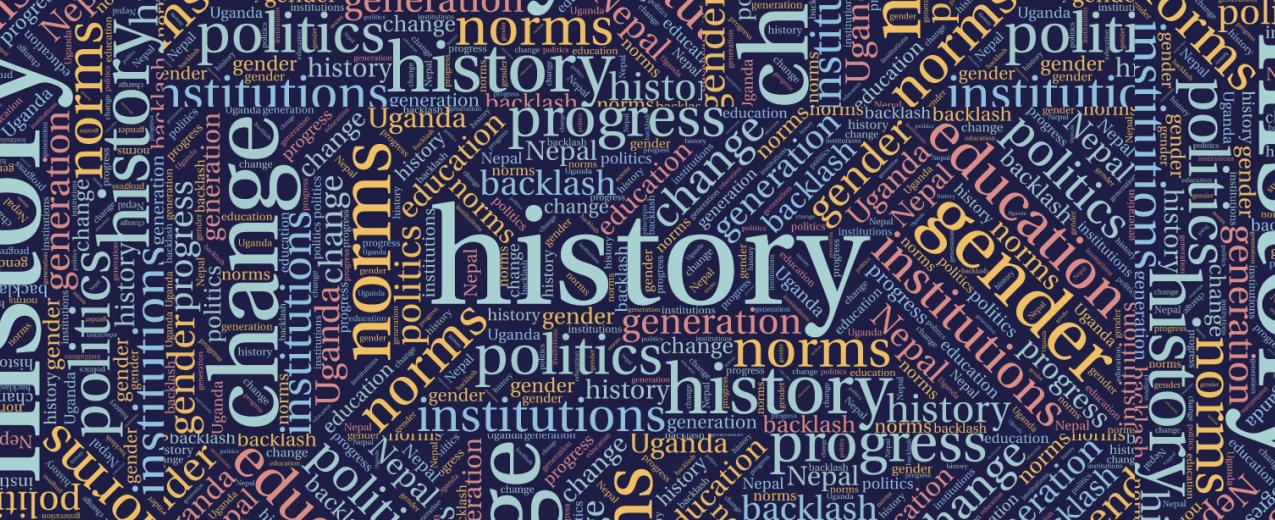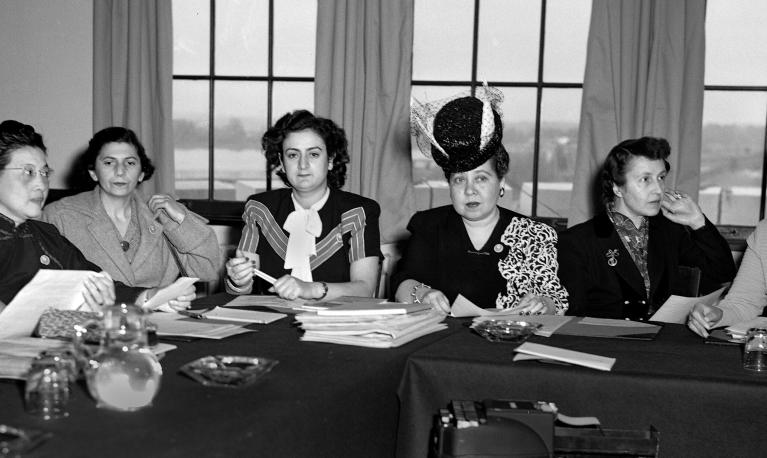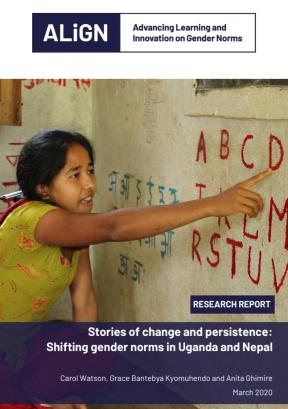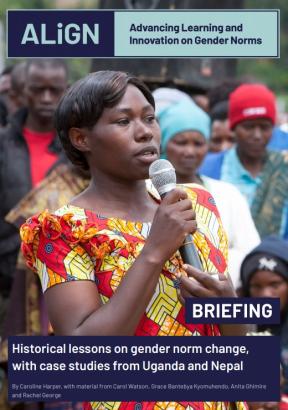
- Blog
- 18 November 2019
‘I was unstoppable!’ - women’s collective agency to change discriminatory gender norms in Uganda and Nepal
- Author: Carol Watson
- Published by: ALIGN
Gender norms have transformed in recent decades in so many contexts – from the UK and US where women’s representation in politics and business has expanded, to Africa, Asia and Latin America, where they have greater political, financial and social inclusion than ever before. Researchers, however, must still explore how and why gender norms change and, crucially, what makes changes ‘stick’. Too often, hard-won changes encounter a backlash that can erode progress over time.
This has motivated ALIGN’s ‘History and change’ research series, led by Carol Watson with Grace Bantebya Kyomuhendo in Uganda and Anita Ghimire in Nepal. The research teams conducted interviews in both countries to understand how different generations of women and those around them have experienced gender norms and changes over their lifetimes and what particular drivers of change have been had the greatest impact.
One emerging theme is the power of ‘collective agency’ to drive change. Women in both countries reported the sense that the efforts of individual women to push back against harmful gender norms in their daily lives was matched by powerful collective agency by women and their communities (including men), amplifying their voices and maximising their resources and strategies to push for change.
The importance of understanding the history of women’s movements and progress on gender equality over time is increasingly recognised. And the research conducted in Uganda and Nepal aimed to capture recent history to provide a longer view of the transformation of gender norms in these countries.
Rather than searching for a ‘one-size-fits-all’ solution, the research suggests the need to support brave and powerful women who push for change in different ways. At the same time, we should enhance our understanding of the policies and programmes that support their efforts and that have helped to shift gender norms over centuries.
Women’s ‘collective agency’ to drive change
In both countries, women came together at pivotal political moments when the national environment was conducive to socio-political change and women’s voices were promoted as part of wider changes.
In Uganda, the high point of the women’s movement was the decade between 1986 and 1996. The coming to power of the National Resistance Movement enabled women to promote their interests – joining government, establishing civil society organisations, and launching new academic studies and thinking around women and gender. There was an excitement around women’s rights and development both nationally and internationally: the decade was framed by the two international conferences for women held in Nairobi and Beijing.
‘It was like opening a cage where the dog is caged all this time. When I got out I was unstoppable.'
‘In the late 80s to mid-90s, when women were the most influential, you could feel the vibe – women speaking to power, engaging with processes and being listened to – with many things to show for it.’
– Women activists in Uganda
In Nepal, women were active participants in the ‘people’s movements’ of the 1990s and the Maoist uprising, mobilising first for social change in rural areas and later moving up through party structures as democratic institutions of government were created. Many report being inspired by the Marxist ideas circulating at the time, aiming for social relations that cast gender equality within the wider framework of social justice.
In both countries, their collective agency was channelled through coalitions to advance women’s interests through government and politics, new civil society organisations and new or refashioned government ministries focusing on women.
What priorities have women worked on collectively?
Legal reform has been a critical priority in both countries as women politicians, activists and lawyers have sought to establish gender equity within law. Such efforts were crystallised in gender-sensitive constitutions (1995 in Uganda; 2015 in Nepal) and a mass of new laws and policies to safeguard and promote women’s rights. Law reform has also been accompanied by advocacy and awareness-raising activities, with outreach to the grassroots.
Education for girls at increasingly higher levels has been prioritised through specific policies in each country, alongside efforts to expand economic opportunities, strengthen reproductive and sexual health care and protect women and girls from gender-based violence. Women’s voice and capacity have also been prioritised and their entry into government and leadership positions in both countries has been aided by affirmative action policies, with women’s coalitions keeping the focus on women’s interests.
‘We were afraid that men with their patriarchal mind set would not put women’s rights in the Constitution, so we formed a women’s caucus to work on this. We did not always agree on everything, but we did agree on women’s rights. We were worried that men were leaving women out and that gave us energy to overcome our differences.’
– Political leader, Nepal
Obstacles to women’s collective agency
Despite the progress made, women still face barriers to political leadership. Affirmative action seats are seen as somehow ‘second-class’, and negative stereotypes about women persist in both countries, such as the image of ‘hens crowing’. Resistance is met in both political party structures as well as at the grassroots.
‘Social norms that keep women in the inferior spaces are transported into both the political and economic realms: In the political realm there is tokenism, affirmative action – make a few women feel comfortable and the others will think it’s OK.’
– Professional woman, Uganda
Collective efforts have had less success when it comes to the implementation of new laws and policies. This requires translating provisions on paper to reality on the ground, where there are still many obstacles. Women who challenge negative gender norms are still accused of being ‘Western-influenced,’ of ‘wrecking the home’, or going against ‘culture’. In Uganda, in particular, the space for civil society activism is shrinking.
‘There have been critical reversals in the gender domain….Things we thought we had overcome 20 years ago are now becoming the norm again and in more powerful manner’
– Professional women, Uganda
The findings reinforce the need to understand how individual women have acted – and united with others in their lives – to enact change, as this can illuminate our understanding of how change works and, in turn, support the design of programmes that lead to changes that last.
Next steps
The research signals the need to nurture and strengthen women’s collective agency through:
- a continued focus on education, skills and leadership training
- the creation of a conducive political environment in which women’s voices are valued and promoted
- increased space and resources for both government and civil society institutions working on women’s rights and social justice
- and stronger coalitions and alliances across political parties, sectors and areas of expertise, as well as between women and men.
Intensified efforts to link with the grassroots and to focus on vulnerable groups of women and girls will help to solidify the sense of a movement, while expanded information and awareness-campaigns are vital to confront discriminatory social norms. As collective agency requires individual agency, individual girls and women should be supported and guided to break gendered barriers, while the promotion of gender-equitable socialisation processes should be encouraged in families, schools and communities.
‘The women’s movement needs to be broadened into a grassroots movement rooted in people and not dependent on a few women leaders – mainly in NGOs. We need movement-building for collective power and voice.’
– Professional woman, Uganda
‘This is about the little space that you create – the little change that you make and the new awareness you have build and then, as in a relay race, you pass the baton on to others.’
– University professor, Nepal
Please visit the ‘History and Change’ section on the ALIGN platform for further details on this research and wider resources and learning materials on understanding gender norms and how they change.
The full country research reports for Uganda and Nepal are available online, along with country briefing notes and a lessons learned paper synthesising key findings from the study in each country, by Carol Watson and contributing authors Grace Bantebya Kyomuhendo (Uganda) and Anita Ghimire (Nepal).
About the author

Blog
1 October 2020

Report
20 March 2020

Briefing paper
5 March 2020
